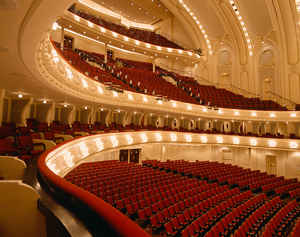Outreach has yielded empty halls. Let’s give orchestra concerts for free
NewsA radical point of view from Chicago Symphony violist, Max Raimi:
On Saturday I took part in a Chicago Symphony concert that struck me as an example of the “outreach” we hear so much about in the classical world done right. The brilliant Black pianist Marcus Roberts performed his “Rhapsody in D” featuring his trio (piano, drums, and bass) with the orchestra, a skillfully written vehicle for his unique talents. Interspersed in the program were spirituals performed gorgeously by the Adrian Dunn Singers, including “Going Home”, which is based on the opening of the slow movement of the work that ended the program, Dvorak’s “New World” Symphony.
The attendance was beyond disappointing; I doubt that the pavilion was 40% full. The next night, as a gesture following the horrific events of July 4 in Highland Park, Ravinia offered free tickets to all Highland Park residents. The tickets were snapped up in a matter of hours and we had a full house for Beethoven and a relative rarity, the Strauss “Alpine” Symphony. A month before, 12,000 people had heard our orchestra in Millennium Park, another free event.
Many years ago, in one of the innumerable emails I wrote to Henry Fogel, who was then the President of the Chicago Symphony (I suspect that at some point he blocked me in self defense), I made a modest proposal. In view of the fact that our outreach initiatives of the past several decades had had no discernible effect on the size and makeup of our audiences, might a very different approach be in order?
Suppose we took all the money we spent on outreach and invested it in lower ticket prices, or simply more free concerts? Or in letting people in certain South and West Side zip codes get significantly discounted tickets? Isn’t it worth a try? What do we have to lose?
Your thoughts, please.






Comments